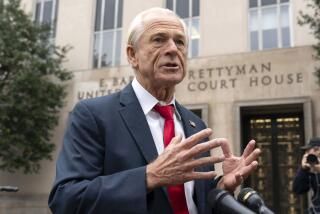The administration that cried wolf on spying
THE BUSH administration’s abrupt acknowledgment that it can, after all, track suspected terrorists without shredding the privacy rights of Americans inspires mixed reactions — relief that the rule of law has triumphed, suspicion that the administration’s concession isn’t all that it’s cracked up to be and, most of all, anger at the president and his surrogates for suggesting that any criticism of their tactics was tantamount to treason.
After the New York Times revealed in December 2005 that the National Security Agency had been eavesdropping on Americans without the court order required by the Foreign Intelligence Surveillance Act, the administration insisted that the privacy protections of FISA — about which it had raised no public alarm — had been rendered obsolete by the war on terror.
In the middle of the uproar that followed the disclosure of the program, Bush vowed, “I’ll continue to reauthorize this program for so long as our country faces a continuing threat from Al Qaeda and related groups.”
The threat remains. But this week Bush said, essentially, “Never mind.” As a federal appeals court prepared to hear arguments on the legality of the program, Atty. Gen. Alberto R. Gonzales told the Senate Judiciary Committee that the administration has determined that it can obtain court orders for surveillance with the “speed and agility” necessary to detect terrorist conspiracies.
“Accordingly,” Gonzales deadpanned, “under these circumstances, the president has determined not to reauthorize the Terrorist Surveillance Program when the current [presidential] authorization expires.”
A similar “never mind” letter was dispatched to the clerk of the U.S. 6th Circuit Court of Appeals, which has agreed to review a federal district judge’s finding that the program violated FISA and the Constitution.
The Bush administration is now conceding what this page and many members of Congress have argued for months: The Terrorist Surveillance Program can be conducted consistent with FISA protections. Sens. Dianne Feinstein (D-Calif.) and Arlen Specter (R-Pa.) co-sponsored a bill that would reaffirm the authority of FISA while increasing the emergency period in which investigators could conduct electronic surveillance without a court order.
Such legislation can be shelved if the administration truly has seen the light — but has it? Or is it now operating under a sort of FISA Lite?
In a background briefing for reporters, a Justice Department official refused to be pinned down on whether the administration is now asking the FISA court for authorization to monitor each individual suspect or whether there is a broader grant of authority.
This is unacceptable. The agreement by which the FISA court assumed jurisdiction over the program should be shared with Congress and (if it doesn’t disclose sensitive operational details) with the public. And there would be nothing mean-spirited about a congressional inquiry into why the administration didn’t involve the FISA court when it began this program in 2002.
The public has a right to know in general terms whether and how their privacy is protected by judicial review. Or, as a Justice Department official put it this week, “There’s obviously an advantage to having all three branches involved.” Too bad that civic books lesson dawned on the administration only after it had demonized its critics for making the same point.
More to Read
Start your day right
Sign up for Essential California for news, features and recommendations from the L.A. Times and beyond in your inbox six days a week.
You may occasionally receive promotional content from the Los Angeles Times.






